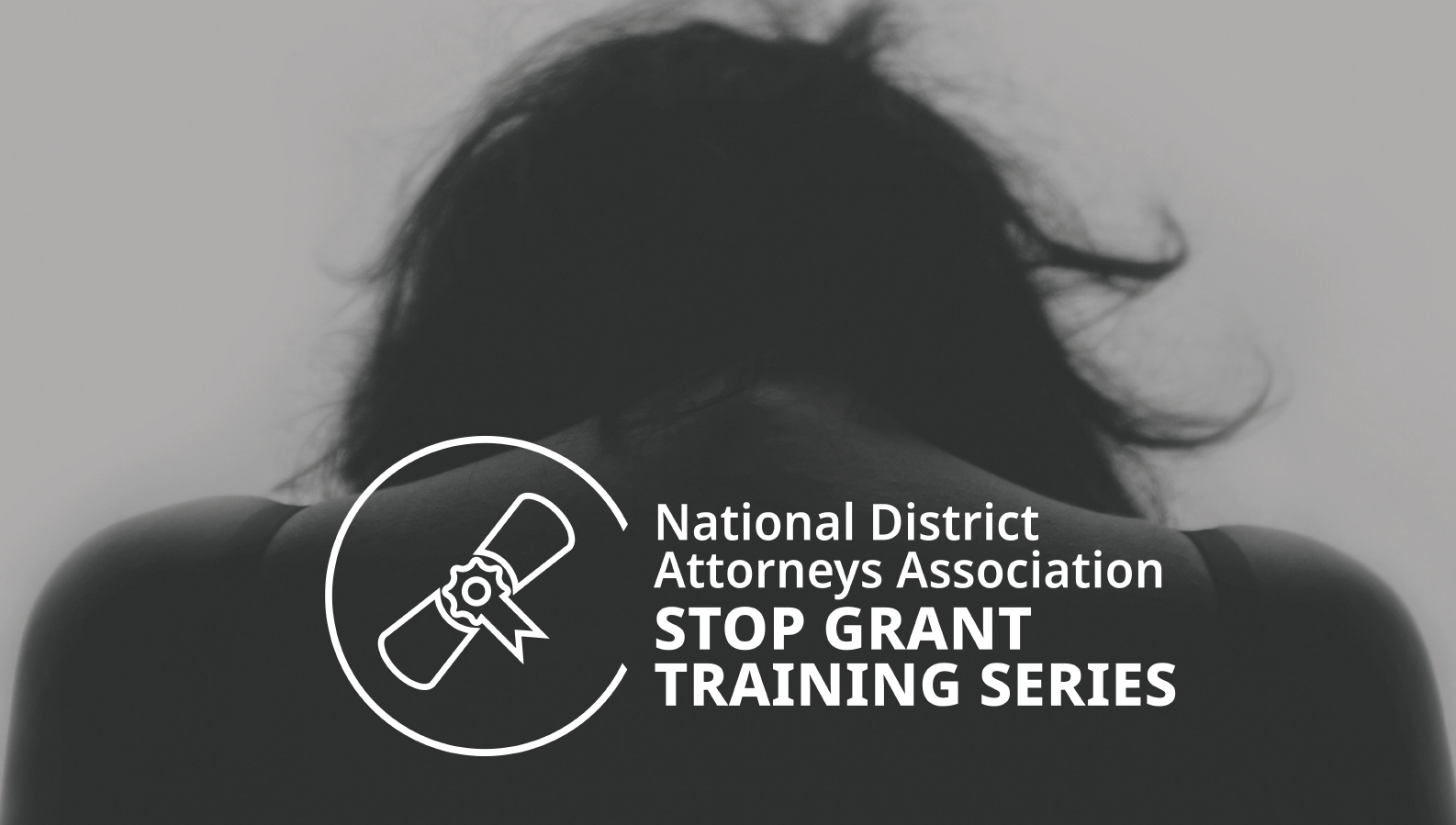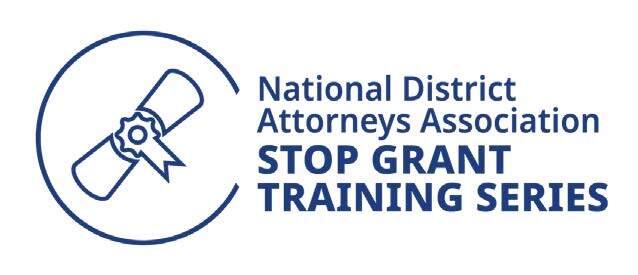
STOP Grant Training Series - Trauma Informed Prosecution: An Effective Victim-Centered Approach (On-Demand)
Recorded On: 06/28/2024
- Registration Closed

On-Demand STOP Grant Training Series - Trauma Informed Prosecution: An Effective Victim-Centered Approach
75 minutes
The term "success" in prosecution looks different based upon who is using it. We don’t get to choose our victims or their circumstance. Therefore, we learn ways to support them under the circumstances of the re-traumatizing criminal justice process. This victim-centered presentation takes a deep dive into how we process, prosecute, and protect our victims who are impacted by trauma. Facilitators will explore:
- The impact of trauma and how it can show up in your interactions with your victim.
- Offer guidance on trauma informed interviewing.
- Best practices that empower and restore a victim/survivor’s sense of agency and trust in our criminal justice systems.
This is part one of the STOP Grant Training Series: A Victim-Centered Approach to Prosecution.
Cost:
Members: $75.00
Non-Members: $100.00
If you would like to become a member, please join here!
Eligibility:
NDAA’s mission to serve and support prosecutors and their staff. In consideration of this commitment, NDAA requires that all those in attendance of our programs currently work in or work closely with prosecution: NDAA invites prosecutors, law enforcement officers, investigators, lawyers and paralegals in local, state, tribal, federal and military government attorneys’ offices. If you are not sure about your eligibility, please contact training@ndaajustice.org.
Questions?
Please contact training@ndaajustice.org.

STOP Grant Training Series: A Victim-Centered Approach to Prosecution.
All STOP Formula Grant Program recipients must certify eligibility to receive STOP funding pursuant to 34.U.S.C. § 10454 and NDAA is here to help! This training series will cover victim-centered approaches in domestic violence, sexual assault, dating violence, and stalking cases as well as policies that support victims such as cultural competency, trauma-informed prosecution, evidence-based practices and more.
Series Abstract
Pursuant to 34 U.S.C. § 10454, for a prosecutor’s office to be eligible to receive subgrant funds under the STOP Formula Grant Program, the head of the office must certify to the State, Indian tribal government, or territorial government receiving the STOP funding, that the office will, during the 3-year period beginning on the date on which the subgrant is awarded, engage in planning, developing, and implementing:
- Training developed by experts in the field regarding victim-centered approaches in domestic violence, sexual assault, dating violence, and stalking cases;
- Policies that support a victim-centered approach, informed by such training; and
- A protocol outlining alternative practices and procedures for material witness petitions and bench warrants, consistent with best practices, that will be exhausted before employing material witness petitions and bench warrants to obtain victim-witness testimony in the investigation, prosecution, and trial of a crime related to domestic violence, sexual assault, dating violence, and stalking of the victim to prevent further victimization and trauma to the victim
The goal of the webinar series is to assist prosecutors’ offices in meeting the statutory certification requirements listed above. The series will focus on:
- Victim-centered approaches in domestic violence, sexual assault, dating violence, and stalking cases:
- Understanding counterintuitive behavior of victims, the neurobiology of trauma, and how to conduct trauma-informed interviewing.
- Protecting the victim’s account through motion practice to lessen re-traumatization at trial.
- Working with victim specialists and community-based advocates to better serve victims.
- Corroborating a victim’s account without eyewitness testimony or physical evidence
- Considerations to secure witness/victim testimony.
- Consequences for varying means of compulsion.
- Alternatives to compulsive measures.
- Evaluating and prosecuting a case with and without victim participation.
- Wellbeing considerations for working with victims. Taking care of yourself.
Resources will include:
- Peer-reviewed publications and research.
- Court cases associated with victim compulsion.
- Best practices.
- Model policies.
Audience:
- Prosecutors
- District attorneys
- Victim Advocates (community based and prosecutors’ offices)
- Investigators within prosecutorial offices or law enforcement agencies.

E. Dalia Racine
District Attorney
Douglas County
Dalia Racine is the Douglas County District Attorney. She has lived in Douglas County for over 15 years with her husband, a Douglas County educator, and their 3 children. Dalia brings almost 17 years of prosecutorial experience to serve our community. She has specialized in homicides, crimes against women and children, and human trafficking. Dalia also served as an Attorney Advisor with AEquitas, where she provided training and technical assistance around gender-based violence investigations and prosecutions to prosecutors, law enforcement, and allied professionals across the country and internationally.
Dalia has championed the responsibility of elected prosecutors to keep their communities safe by implementing innovative practices and policies that reduce the number of repeat offenders who cause harm and diverting them out of the criminal justice system by connecting to resources that bring individual and community healing. Dalia has integrated Smart Justice while holding dangerous offenders accountable in our prison system. Additionally, Dalia has made it a priority for the District Attorney's office to be an integral part of our community and to keep servant leadership at the forefront of everything we do.
No matter if it involves serving her community, raising her children, or tolerating her rowdy Great Dane, Dalia tries to live by the quote from Winston Churchill and states, "Success is not final, failure is not fatal: it is the courage to continue that counts." The adventure is in the journey.
Dalia is proud of the work that she strives to do to bring systemic change and ensure that we have a criminal justice system that is firm but fair to all.
Rita Davis-Cannon
Ed.D.
Prosecuting Attorney’s Council of Georgia
Rita Davis-Cannon is a career crime victim rights advocate currently serving as the Director of Victim Services for the Prosecuting Attorneys’ Council of Georgia . In this role, she provides statewide consultation, training, and program development to Georgia’s prosecution-based victim witness assistance personnel. Additionally, this platform allows her to present the needs and concerns of crime victims to the community, elected officials, agencies, and public policy makers through education, resources, collaboration, and advocacy. When she is not speaking at community forums on the significance of collaborative efforts to support the rights of victims, she is serving on local and national boards advocating for change. Rita’s relentless fight for victim rights have been consistent for over 22 years. Her works continue to contribute to the sweeping changes found in our criminal justice systems. More importantly, her life and her works are responsible for profoundly changing the lives of thousands of crime victims.